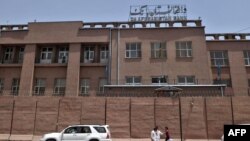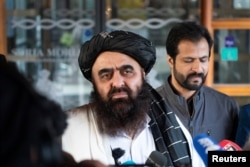The United States and the Taliban are scheduled to hold talks in Qatar later this week that are expected to focus on economic and banking sanctions on Afghanistan, where last week’s devastating earthquake has worsened a humanitarian crisis.
Taliban Foreign Minister Amir Khan Muttaqi, along with senior Finance Ministry officials and representatives of the Afghan central bank, traveled to Doha Wednesday to attend the meeting.
Muttaqi’s office said U.S. special envoy for Afghanistan Thomas West, accompanied by Department of Treasury officials, will lead the U.S. delegation at the talks in the Qatari capital.
U.S. officials are reportedly working with the ruling Islamist group on a mechanism to allow the Afghan central bank to use its frozen foreign funds, worth billions of dollars, to deal with a hunger crisis stemming from years of Afghan war and persistent drought, according to a report this week in The Washington Post.
The proposed framework would have to ensure the Taliban insurgent group-turned-rulers do not benefit from the money and it is used only to avert a humanitarian disaster in a country where the United Nations says more than half its estimated 40 million people is in need of emergency aid.
Western countries froze around $9 billion in Afghan central bank assets, mostly held in the U.S., after the Islamist Taliban seized power from the internationally backed Afghan government last August as American and NATO troops withdrew from the South Asian nation.
Western countries also suspended financial assistance to largely aid-dependent Afghanistan, isolating the country’s banking sector in the wake of long-running terror-related sanctions on the Taliban.
Last week, U.S. President Joe Biden’s administration acknowledged that efforts were underway to seek a resolution to the Afghan funding problem and get funds moving.
“We are urgently working to address complicated questions about the use of these funds to ensure they benefit the people of Afghanistan and not the Taliban,” White House Press Secretary Karine Jean-Pierre told reporters on Saturday.
Biden issued an executive order in February that was aimed at freeing half the $7 billion in frozen Afghan central bank assets on U.S. soil. The money would be used to benefit the Afghan people while the rest would be held for the ongoing terrorism-related lawsuits in U.S. courts against the Taliban.
But humanitarian challenges have intensified in parts of Afghanistan. A powerful earthquake on June 22 killed some 1,150 people, including at least 155 children, and destroyed or damaged hundreds of homes in hardest-hit southeastern Paktika and Khost provinces, according to Taliban officials and global aid agencies.
The disaster reportedly prompted Biden aides to begin talks to allow Afghanistan at least partial use of the frozen funds, while keeping them out of the hands of the Taliban.
“So, in signing an executive order several months ago, the president took a significant step to preserve these funds and ensure they go toward benefiting the people of Afghanistan. If the president hadn’t taken this action, the funds would have remained tied up for years,” Jean-Pierre reiterated on Saturday.
The Biden administration announced on Tuesday the United States will give nearly $55 million in immediate humanitarian assistance to people in Afghanistan impacted by the earthquake.
The State Department said the funds will be used to deliver essential food items, clothing, cooking utensils, blankets, jerry cans, and sanitation supplies to prevent waterborne diseases in the disaster-hit Afghan areas.
“The United States has an enduring commitment to the people of Afghanistan, and we welcome and encourage support from our international partners in this time of great need,” Secretary of State Antony Blinken said in a statement on Tuesday.
U.S. officials noted that Washington has been the largest humanitarian donor to Afghanistan and committed more than $774 million in humanitarian assistance over the past year.
No country has yet recognized the Taliban’s interim government, citing concerns over terrorism and human rights, particularly restrictions on women’s rights to education and work.








